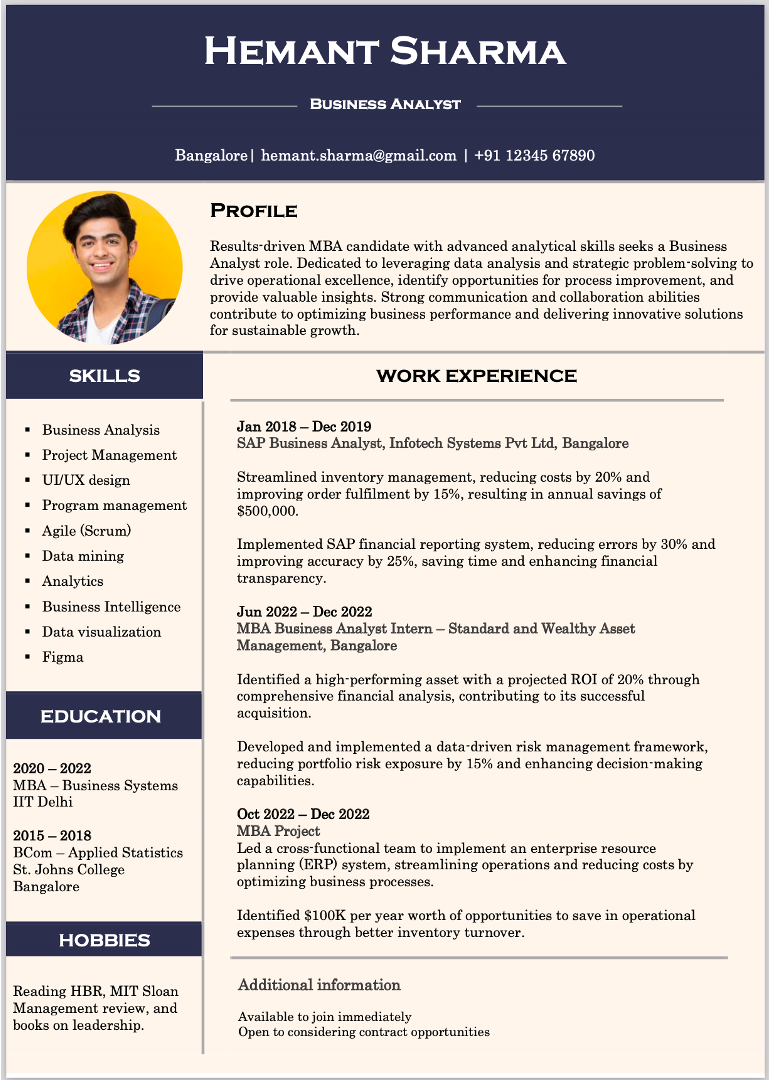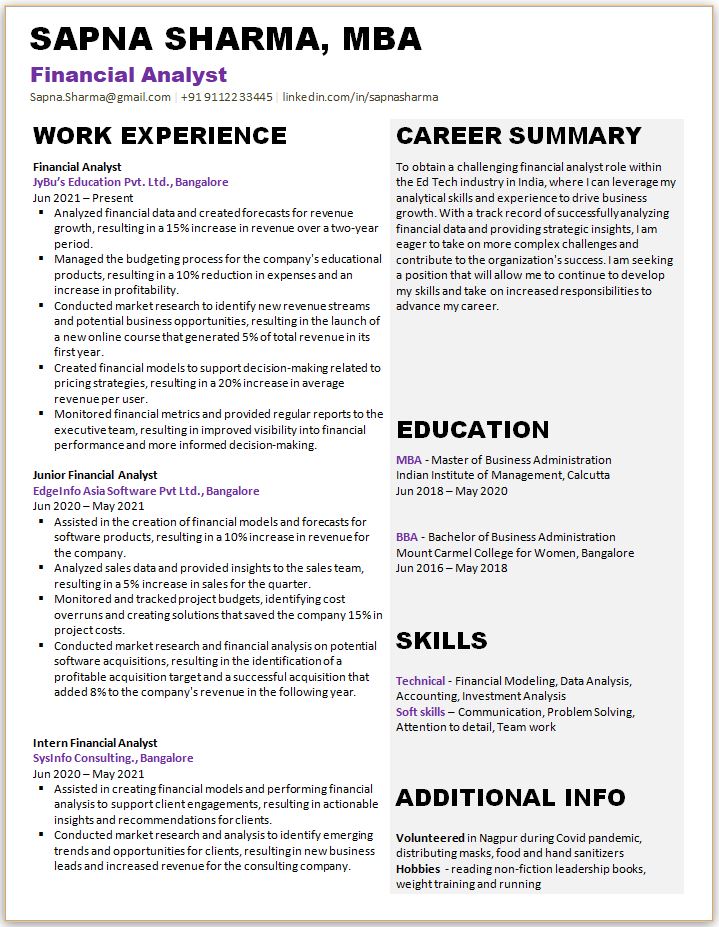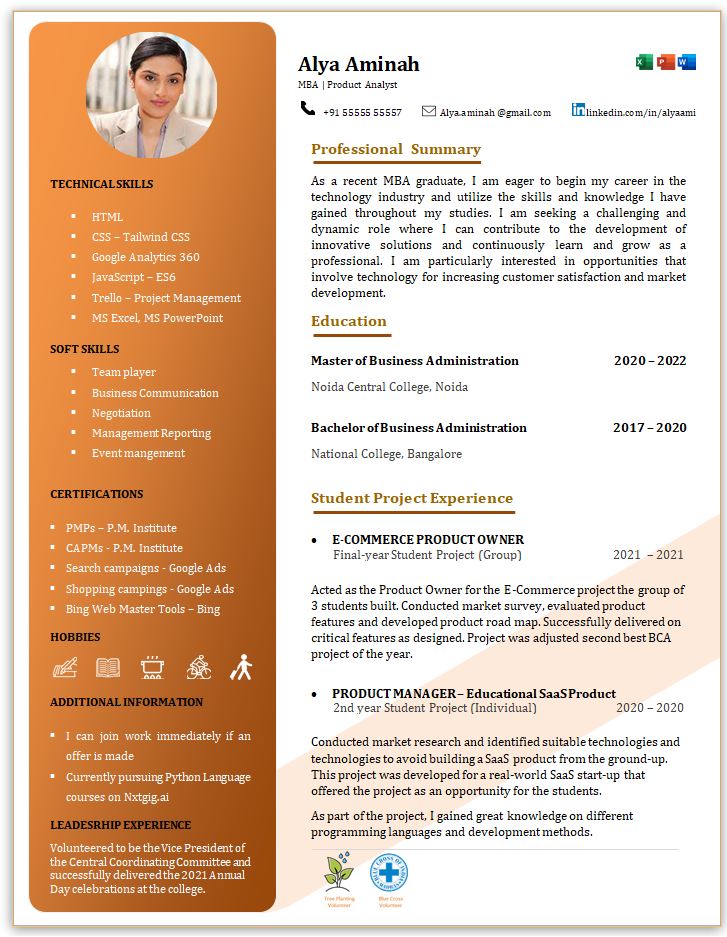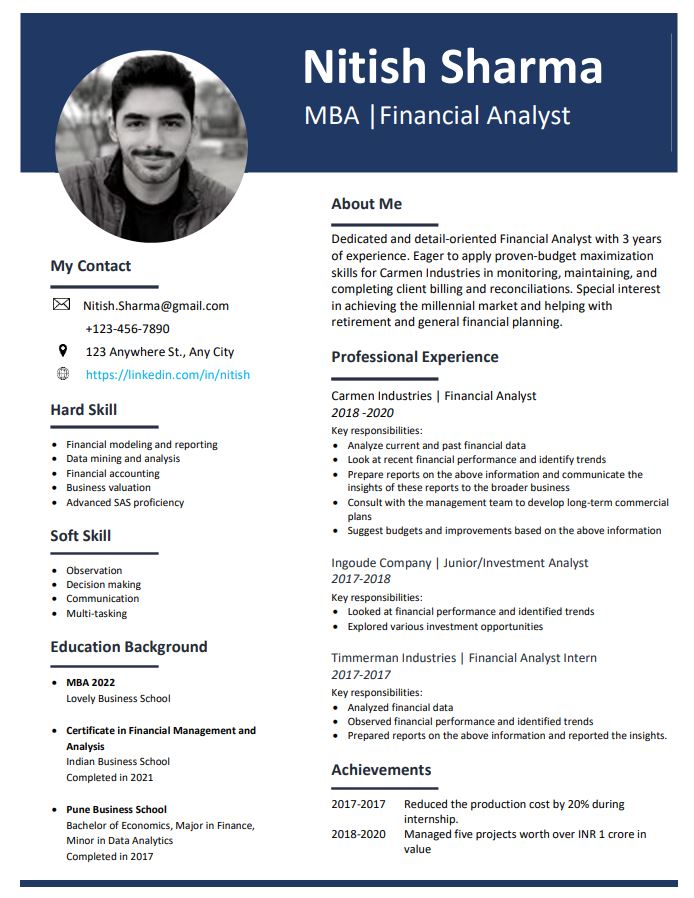Teamwork interview questions and answers - with examples

05 Feb 2024
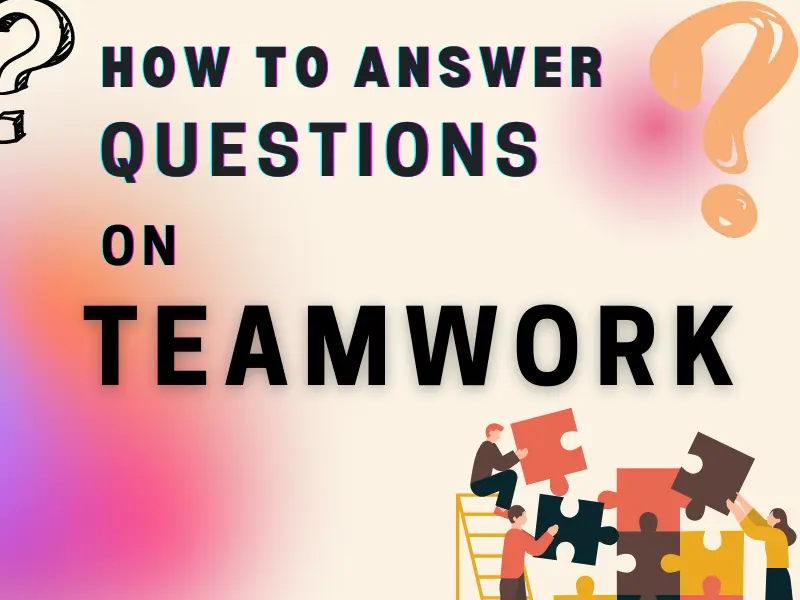
Most common teamwork interview questions and answers
One of the most important skills you will be interviewed on is Teamwork, no matter what the industry is. Teamwork is in fact one of the most important skills that candidates are interviewed on in the Technology / Information Technology (IT) industry. If you are going to be working as an engineer, software manager, product manager, business analyst, QA analyst etc, you will be working in a team.
If you are on the job market for your next role, it is going to be very likely that you will be interviewed on your teamwork capabilities. Interviewer can ask you a variety of questions - behavioral or situational, to assess your abilities to work effectively on a team. In order to have a successful interview, it is important to prepare your responses.
In this article, we will talk about what is teamwork, the importance of teamwork and the various type of questions you can be asked to assess your teamwork abilities. We will also cover the most commonly asked questions on team and answers to them.
What is teamwork?
Teamwork is the process of collaborating with other people to accomplish a common goal. This collaboration can happen through various mediums such as email exchange, meeting and discussions, offline conversations, in person meetings etc. The uber objective of teamwork is to work towards a common goal, while triaging through different issues in the process.
Why is teamwork important?
Unless you are in Research, it is very likely you will be working with other people. Even research scientist or PhD candidates are required to collaborate with their counterparts to co-author paper. In a corporate setting, it is highly likely you will be assigned a project, with you being one of many contributors. If you are an engineer, you will be familiar with sprint planning meetings, where the scrum master will go around the horn and understand what each contributors are working on, what are their bottlenecks, if they require any oversight or additional support. Such kind of setting is very common in corporate offices.
The reason it’s important is because it is the most effective way of getting things done. This way we are able to leverage the knowledge and expertise of other people, without having to do / learn everything ourselves. In fact, it is the most underrated effective mechanism of moving the needle on important matters. However, building effective teams where each team member is valued and also leveraged is an art.
Given the importance of teamwork in our everyday settings, it is quite natural for interviewers to ask questions to understand candidates’ effectiveness in being a team player.
By the way, we have a variety of resume templates that focus on teamwork in the way work achievements are listed. If you have not checked them out, take a look at Sample Resume Formats
Sample Teamwork related questions to prepare for an interview:
- What role do you usually take in a team?
- Describe a situation when you had to take a leadership role in a team?
- Describe a situation when you faced obstacles within a team and how did you overcome them?
- Tell me about a time when you had to resolve conflict within a team?
- How do you handle difference of opinions within a team?
If you are in a managerial role, see below structure for teamwork related questions. We will provide a sample approach and sample answers to each of these most commonly asked team work questions for managerial candidates.
1. Tell me about a time when you had to delegate tasks to a team. How did you decide the best fitment for the task?Structure your answer in the format below.
Understanding the Project Requirements: Before delegating tasks, you conducted a thorough analysis of the project requirements and break down the application development into key components, such as frontend design, backend development, database integration, and testing.
Assessing Team Member Skills and Expertise: You reviewed each team member's skills, expertise, and past project experiences to understand their strengths and capabilities.
Matching Tasks to Skills: Based on the analysis of project requirements and team member expertise, you assigned tasks to each team member.
Communicating Task Assignments: During a team meeting, you communicated the task assignments, explaining how each person's skills align with the assigned tasks and how their contributions are vital for the project's success. You encouraged open communication, allowing team members to express any concerns or suggestions regarding the task distribution.
Adapting to Challenges: Throughout the development process, you remained flexible and open to adjustments. If any team member faced challenges or believed that their skills might be better suited for a different task, you considered reassigning tasks to ensure optimal performance and efficiency.
Monitoring Progress: As the project progresses, you held regular status meetings to monitor the team's progress and address any roadblocks. You provided support and guidance to team members, ensuring they have the resources they need to fulfill their roles effectively.
Recognizing Achievements: Upon successful completion of the mobile application, you celebrated the team's achievements and recognize each member's contributions during a project review. You acknowledged their dedication, collaboration, and hard work, fostering a positive team culture.
2. How do you resolve conflict at work?Use the following structure to construct your answer.
Address the Issue Early: Don't let conflicts escalate. Address them as soon as possible to prevent further tension and negative impacts on the team's dynamics.
Listen Actively: Allow all parties involved to express their perspectives and concerns without interruption. Actively listen to understand their viewpoints and emotions.
Stay Calm and Professional: As a mediator, remain composed and avoid becoming emotional. Maintain a professional demeanor to set a positive tone for the conflict resolution process.
Identify the Root Cause: Determine the underlying reasons for the conflict. Often, conflicts arise from miscommunication, misunderstandings, differences in opinions, or unmet expectations.
Find Common Ground: Look for areas of agreement and shared interests between the conflicting parties. Focusing on common goals can create a foundation for finding solutions.
Explore Solutions Together: Encourage the parties to collaborate and propose potential solutions to the conflict. Discuss the pros and cons of each suggestion.
Be Objective and Fair: Remain neutral and impartial throughout the process. Ensure that no one feels their concerns are being dismissed.
Prioritize Win-Win Solutions: Aim to find resolutions that benefit all parties involved rather than favoring one side over the other.
Seek Mediation if Necessary: In more complex conflicts, consider involving a neutral third party, such as a supervisor or HR representative, to facilitate the resolution process.
Establish a Plan of Action: Once a resolution is agreed upon, outline clear steps and responsibilities for implementing the solution.
Follow Up: Check in with the parties involved after the conflict resolution to ensure that the agreed-upon solutions are being implemented and that the situation has improved.
Learn from the Conflict: Use the conflict as an opportunity for growth and learning. Analyze what led to the conflict and identify ways to prevent similar issues in the future.
Remember that conflicts are a natural part of human interactions, and addressing them constructively can lead to stronger relationships and a more productive work environment. It's essential to approach conflict resolution with empathy, understanding, and a willingness to find common ground.
How to answer teamwork related questions in interviews?
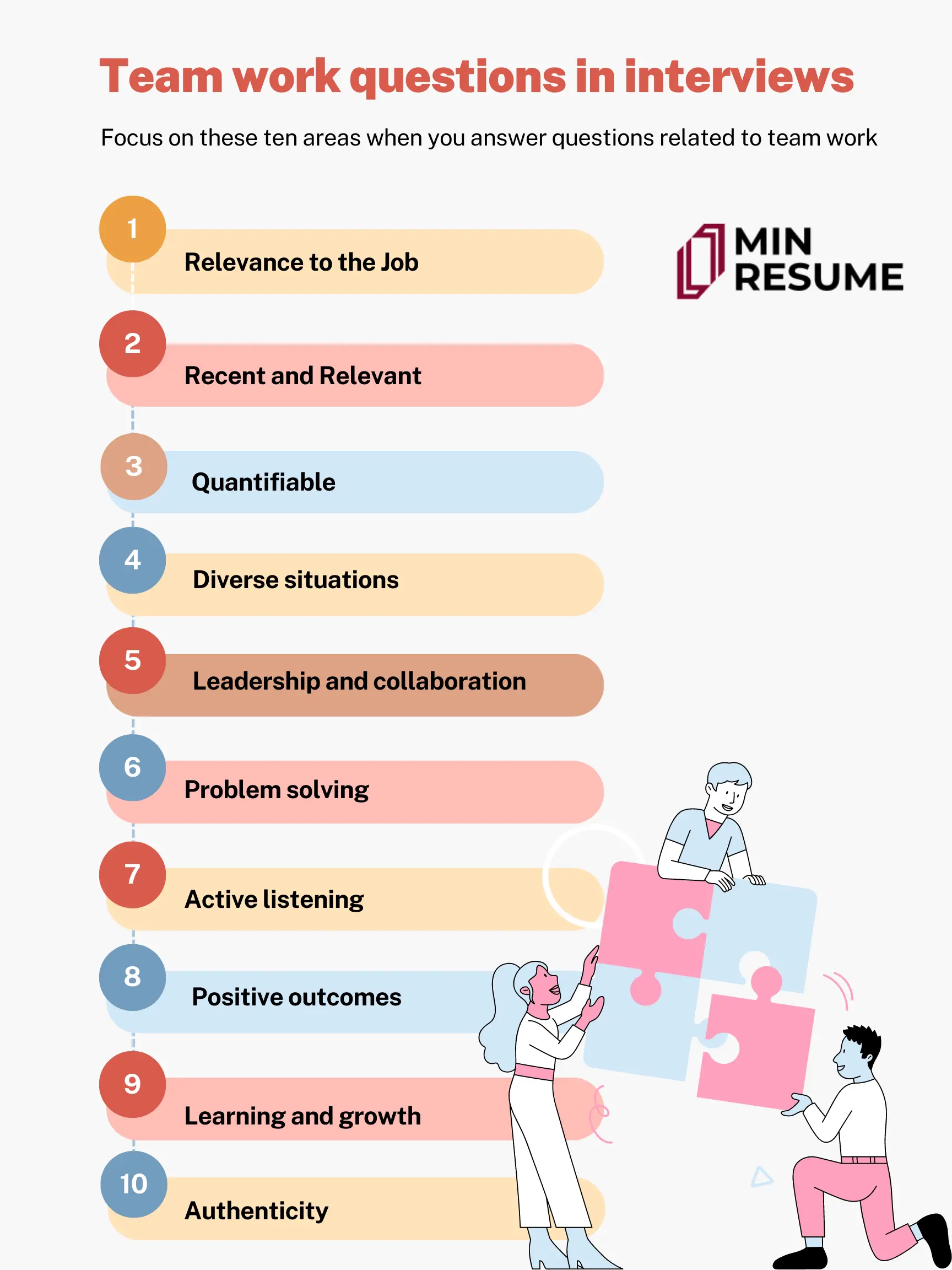
Answer: My natural style is to lead in a team setting. I like building consensus and bringing people together to solve a problem. I always welcome the opportunity to consolidate ideas from others, if dynamics of the group is such that I need to be a follower - I am more than happy to welcome the opportunity. Although my natural style is to lead, I am happy to adopt to the situation, whatever the organic nature of the group dynamics are. I adopt and evolve to the situation. In my last project, my manager appointed me the team lead to gather all client requirements.
2. Describe a situation when you faced conflict in a team setting and how did you resolve it?Answer: I was working on a cross functional team, with the goal to deliver a new product launch for the team. The team comprised of various departments with very different backgrounds and expertise.
Answer: During the early stages of this project, I faced challenges in collaborating with the design team. The main blockers for us were clear and crisp communication on the product requirements. After I identified that the underlying issue was communication, I made sure I was actively listening and understand the concerns from the designers. I held regular project huddles to resolve concerns. Through this process, I was able to build trust within the team. I realize establishing trust is the most important criteria in being able to resolve differences. Post that we were able to come together on ideas, weighing the pros and cons. The regular project huddles immensely helped close any impending differences.
Teamwork is an essential skill in most job roles, and interviewers often ask questions to assess a candidate's ability to work effectively in a team.
Here are a few more commonly asked teamwork questions in interviews along with suggested answers. Follow the same approach we have discussed above and prepare your answers ahead of time. If you pay close attention to these questions, they aren’t really very different from one another as they all have very subtle differences in what each one is measuring.
1. Tell me about a time when you worked successfully in a team.Suggested Answer: "During my college project, I collaborated with a diverse team to develop a web application. We assigned specific roles, communicated regularly, and supported each other throughout the project, leading to a successful and on-time delivery."
2. How do you handle conflicts within a team?Suggested Answer: "When conflicts arise, I believe in open communication and active listening. I try to understand different perspectives, find common ground, and work towards a resolution that benefits the team and project goals."
3. Describe a challenging team project you worked on and how you contributed to its success.Suggested Answer: "In my previous job, we faced tight deadlines on a complex project. I took the initiative to organize regular progress meetings, delegated tasks based on strengths, and offered support to team members. As a result, we met the deadline and received positive feedback from our client."
4. How do you ensure effective communication within your team?Suggested Answer: "I prioritize regular team meetings to discuss progress, challenges, and goals. Additionally, I encourage open-door communication, and I am always approachable for team members to share their ideas and concerns."
5. How do you handle situations when team members are not contributing equally?Suggested Answer: "I believe in addressing the issue directly but tactfully. I would have a one-on-one conversation with the team member to understand any underlying challenges they might be facing and offer assistance or suggest ways to redistribute tasks for a fair contribution."
6. How do you adapt to different working styles within a team?Suggested Answer: "I value diversity in a team and understand that everyone has unique strengths and working styles. I adapt by actively listening to others, being flexible, and finding common ground to achieve our objectives collaboratively."
7. How do you handle a situation where a team member disagrees with your ideas?Suggested Answer: "I view disagreements as opportunities for growth and innovation. I listen to their perspective, provide reasoning for my ideas, and try to find a middle ground that aligns with our shared goals."
8. Describe a time when you took the initiative to improve team efficiency or collaboration.Suggested Answer: "In a previous project, I noticed that communication gaps were slowing us down. I proposed using a project management tool to track tasks and deadlines, which significantly improved our efficiency and coordination."
9. How do you motivate and support your team during challenging times?Suggested Answer: "During tough phases, I stay positive and offer encouragement to keep the team motivated. I also make myself available for support, whether it's offering help with tasks or simply lending a listening ear."
10. Tell me about a time when you had to delegate tasks to other team members effectively.Suggested Answer: "In a group project, I assessed everyone's strengths and delegated tasks accordingly. I ensured each team member had a clear understanding of their responsibilities, and I provided guidance and feedback throughout the process."
How to pick examples for teamwork questions?
It is also important that you supplement your responses with examples. Do not try to come up with examples on the fly, i.e. make sure to have at least two examples ready for each scenarios. Be absolutely clearly about which example you want to use for a specific question, if it comes up.
If you are an experienced professional with many years of experience, coming up with examples will require some effort because you will have a lot of choices. From my experience, go for the examples that are naturally comfortable talking about. Interview is already a stressful experience and talking about examples that you are comfortable talking about will help you calm down those nerves a lot.
1. Relevance to the Job: Choose examples that directly relate to the job you are applying for. Look for experiences that highlight your teamwork skills in a context similar to the role you're seeking.
2. Recent and Relevant: Select recent examples that showcase your current abilities. Emphasize projects or situations that are most relevant to the skills and qualities required for the position.
3. Quantifiable Results: Focus on examples where you can quantify your contributions and the team's achievements. This adds credibility to your responses and demonstrates your impact.
4. Diverse Situations: Pick examples from various contexts such as academic projects, internships, part-time jobs, or volunteer work. Demonstrating teamwork in different settings illustrates your adaptability.
5. Leadership and Collaboration: Include examples where you both played a leadership role in the team and effectively collaborated as a team member. This shows your ability to contribute in different capacities.
6. Problem-Solving and Conflict Resolution: Highlight instances where you successfully resolved conflicts within the team or demonstrated problem-solving skills to overcome challenges.
7. Teamwork Competencies: Ensure your examples cover a range of teamwork competencies, such as communication, active listening, adaptability, and supporting team members.
8. Positive Outcomes: Select examples where the team achieved positive outcomes, whether it's completing a project ahead of schedule, exceeding goals, or receiving recognition for the team's efforts.
9. Learnings and Growth: Share experiences where you learned valuable lessons from working in a team and how it influenced your future approach to collaboration.
10. Authenticity: Be genuine and truthful in your examples. Interviewers appreciate authenticity and are likely to probe further into your responses.
By following these guidelines, you can effectively choose examples that showcase your teamwork skills and leave a lasting impression on interviewers. Remember to practice articulating your experiences to provide clear and concise answers during the interview.
We also have some tips on the kind of examples to avoid. Here are some examples you should steer clear of during interviews:
1. Negative Team Dynamics: Avoid discussing experiences where the team faced constant conflicts or had a toxic atmosphere. Interviewers are looking for positive team experiences that demonstrate your ability to collaborate effectively.
2. Personal Achievements Without Teamwork: While individual accomplishments are impressive, avoid focusing solely on personal achievements that don't highlight teamwork. Showcase experiences where you collaborated and achieved shared goals.
3. Irrelevant or Outdated Examples: Stay away from sharing examples that are not directly related to the job you're applying for or are outdated. Focus on recent experiences that align with the skills required for the role.
4. Limited Team Contributions: Avoid discussing situations where your role within the team was minimal, or you were primarily an observer rather than an active participant.
5. Unresolved Conflict or Failures: Steer clear of examples that involve unresolved conflicts or failures within the team. Instead, emphasize instances where you successfully addressed challenges and achieved positive outcomes.
6. Controversial or Sensitive Topics: Avoid discussing experiences that involve controversial or sensitive topics, as it might create discomfort during the interview. Stick to professional and neutral examples.
7. Excessive Self-Promotion: While it's essential to showcase your skills, avoid excessive self-promotion at the expense of acknowledging the contributions of others in the team.
8. Overly General or Vague Responses: Be specific and provide details in your examples. Avoid overly general or vague responses that don't clearly demonstrate your teamwork abilities.
9. Unrelated Extracurricular Activities: While extracurricular activities can be valuable, avoid discussing examples that have no relevance to teamwork or the job you're seeking.
10. Negative Remarks About Previous Teams: Refrain from making negative remarks about past teams or team members. Maintain a positive and professional attitude during the interview.
By avoiding these examples, you can ensure that your responses focus on positive and relevant team experiences, showcasing your ability to work collaboratively and contribute effectively to achieve common goals. Remember to be honest and selective in the examples you choose to discuss during the interview.
Also, remember that you will be assessed on teamwork throughout the interview and not just from your responses to specific teamwork related questions. Keep the following in mind as you answer other questions as well.
- Active Listening: Show your team spirit by actively listening to the interviewer's questions and responding thoughtfully.
- Non-Verbal Communication: Employ positive body language, such as maintaining eye contact, smiling, and nodding, to express engagement and openness.
- Collaboration Stories: Use real-life examples of successful collaborations in your responses, highlighting your role and the team's achievements.
- Acknowledge Others: When discussing team accomplishments, acknowledge and praise the contributions of other team members.
- Conflict Resolution: If asked about challenges faced in previous roles, share instances where you effectively resolved conflicts and maintained harmony within the team.
Remember, the following skills also fall under Teamwork and Collaboration.
- Building relationships
- Cooperation
- Diplomacy
- Consensus-building
Ready to use modern resume templates
We have simplified the resume creation process for both fresh graduates and experienced professionals by showing examples how to list skills, work experiences, project experiences and hobbies and interests for a variety of jobs and functions. You can find some of them below.
Conclusion
Demonstrating teamwork throughout your interview is an effective way to convince potential employers of your ability to collaborate and thrive within their organization. By actively engaging with the interviewer, using real-life examples, and highlighting your collaboration stories, you can leave a lasting impression as a strong team player. Remember that teamwork is not just a buzzword; it's a valuable asset that can lead you to new career opportunities and a thriving professional journey. Embrace the power of teamwork and make it an integral part of your interview success.
If you have any questions or need further guidance on adding skills to your resume, don't hesitate to reach out. We're here to support you in your job search and help you present your skills effectively. Best of luck on your career journey!
Did you enjoy this article? Then these below might also be of interest to you
1. Resume writing demystified - One of our most popular articles that goes through a lot of misconceptions and clarifies them.
2. Resume format for freshers - If you are a recent college graduate, you would enjoy reading this article as it would provide you with information specific to preaparing your first resume.
3. 50 Hobbies and Interests to put on your resume - If you wondered what hobbies and interests you should put on your resume, this article can help you become more strategic about this fun topic.
